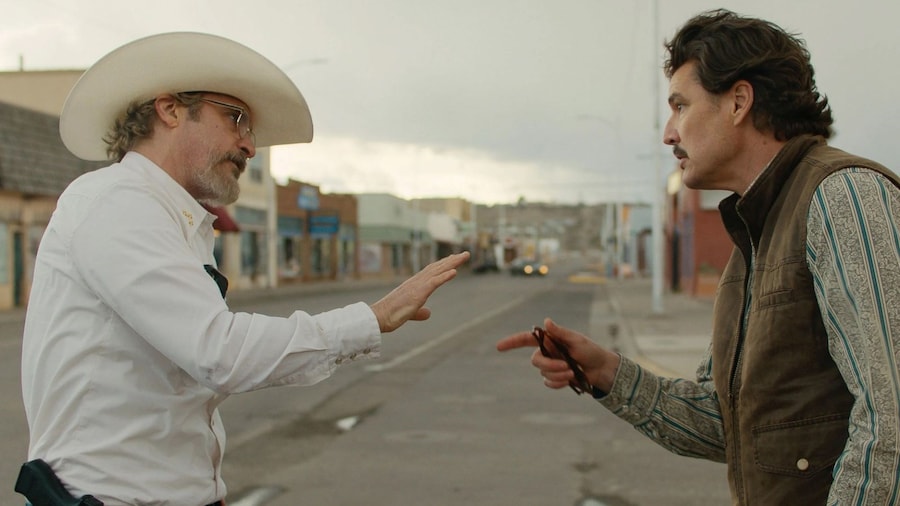Joaquin Phoenix and Pedro Pascal square off in Ari Aster’s Western horror, which premiered in competition at Cannes
We’re all familiar with the hopeful sentiments shared online early in the pandemic – that it was an opportunity to reset, to organise society differently, to return to our social lives with a renewed respect for each other and our differences. Five years on, Ari Aster’s smart but frustrating satire Eddington looks back at the pandemic with a misanthropic lens, recasting those aspirations as infantile and naive, while firmly placing Covid as the genesis of our current nightmare, where technology and disinformation have driven impassible rifts through even the quietest communities.
Eddington is the hot, dry, 2,000-strong New Mexico town in which Joe (Joaquin Phoenix) is the sheriff and Ted (Pedro Pascal) is the mayor. The film opens in May 2020 as Joe – increasingly isolated from his wife Louise (a coldly brilliant but underused Emma Stone), and gathering confidence in his anti-mask, anti-government views – begins an impulsive bid for mayor against Ted. This rivalry sets the town of Eddington on a chaotic and violent path, as Joe and Ted’s opposing politics are entangled with local Black Lives Matter protests, the development of an artificial intelligence data centre outside town, and Louise’s attraction to a charismatic cult leader (a hilarious – and also underused – Austin Butler).
It’s a lot to pack into one movie, but Eddington’s main fault isn’t that it’s overstuffed – it’s that Aster introduces the audience to this broad plot at an initially sluggish pace, plodding through introductions to the ensemble with a surprising lack of wit and energy. However, the story starts to coalesce around a mid-point standoff between Joe and Ted at a barbecue, as they wordlessly grapple over the volume levels of Katy Perry’s Firework. It’s a masterstroke of comic tension, and the scene tilts Eddington propulsively towards its chaotic, cathartic second half.
Aster meticulously recreates the pandemic through uncomfortably familiar details; a striking early image depicts Eddington residents queuing outside a supermarket, spaced five feet apart while an enlarged, grinning Pascal beams down from a reelection mural. Aster also pays close attention to how people looked to their phones for a sense of comfort and connection during lockdown, but also how our phones failed to provide this. Our introduction to Joe finds him watching a reel about how to convince one’s partner to start a family, a clue to his growing distance from Louise. Shortly after, as Joe crawls into bed next to a wooden, awkward Louise, the camera tilts uncomfortably sideways – at exactly the angle you might hold your phone while doomscrolling in bed.
Aster’s integration of screens in the film’s visual language is both elegant and disorienting in a way few filmmakers have been able to achieve in the iPhone era. Several times, certain shots appear at first to be part of the film’s live timeline, before a zoom-out reveals them to be content on a character’s phone. It’s one of several ways Aster evokes the distorted truths of 2020 and, as Joe becomes increasingly mistrustful and impulsive, we witness just how easy it is for someone to manipulate this confusion for their benefit. It’s difficult to indicate the direction all this heads in without revealing pivotal spoilers, but suffice to say these simmering tensions turn Eddington (the town) into a surreal, violent playground, and Eddington (the movie) into something more tonally akin to Aster’s previous film, Beau is Afraid.
Throughout Eddington, Aster’s strength is his understanding of the way people felt the need to blame someone, or something, for the disruption wrought by the pandemic, and how this in turn led to everyone feeling like victims, regardless of how true or constructive that victimhood might have been. In one particularly sharp – and deeply uncomfortable – scene, as the Black Lives Matter protests are growing in size in Eddington, white high schooler Sarah (Amélie Hoeferle) yells in the face of the sheriff’s Black trainee Michael (Michael Ward) about her privilege. Notably, her words focus on how her whiteness has failed her personally, not the world around her.
Ultimately, the character with the largest victim complex is Joe, and Phoenix taps expertly into the same sense of confusion and fear he brought to Beau is Afraid. He’s the butt of the joke for much of Eddington, but towards the end of the film, Aster positions his paranoia and anger at the world as a nightmare we’re all complicit in. Five years on from that historical turning point, Eddington argues that the pandemic did indeed give society a reset – but as technology warped our understanding of reality, it wasn’t the reset we needed.
